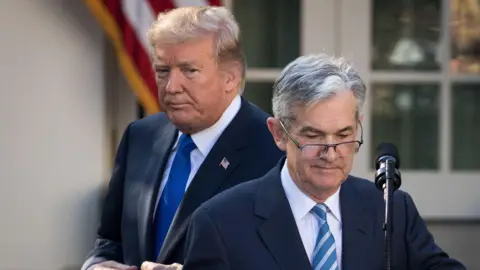Why Trump keeps attacking the US central bank
 Getty Images
Getty ImagesUS President Donald Trump has some well-known nemeses: illegal immigrants, low-flow showers and last, but definitely not least, the head of the US central bank.
Elevated by Trump to lead the Federal Reserve starting in 2018, Jerome Powell almost immediately found himself under fire - described on social media as a bonehead and questioned about reports that the president wanted him gone.
But however uncomfortable Powell might have been then, his position has only gotten worse.
Not only is he overseeing an economy where the risk of recession is rapidly rising, Trump has been flirting publicly with his removal, writing on social media last week: "Powell's termination cannot come fast enough!"
Coming at a time when Trump has pushed to expand presidential power, while cowing political opponents and ploughing past judicial efforts to check his action, it has raised alarm that he is more serious about, and might be more able to, exert control over the Fed than during his first term.
The tensions cooled this week, when Trump, a day after a market slide that some analysts tied to the comments, denied to reporters that he ever had any intention of firing Powell.
It came amid other hints of de-escalation in Trump's economic rhetoric as his policies, especially trade tariffs, have faced rising political and business backlash.
But Trump did not offer much assurance that he would limit his interventions at the Fed, maintaining his right to have a view and noting that he might call Powell to discuss his concerns about the bank's interest rate policy.
Donald Kohn, a senior fellow at the Brookings Institution and the former vice chair of the Federal Reserve, said the shift in tone appeared intended to calm financial markets but he did not think it marked the end of a fight over the Fed, an institution considered vital to the health of the world's largest economy.
"It's a testimony to the market's response," he said. "But I think it's way too soon to say that there's a stability there."
What is Trump's problem with Powell?
Trump's clash with the Fed is ostensibly rooted in differences over where the bank should fix its key interest rate, which plays an influential role shaping borrowing costs for credit cards, mortgages and other loans.
Lower rates make it easier to borrow and tend to deliver an economic boost. Higher interest rates dampen activity, helping to keep prices stable.
Trump, who cut his teeth professionally taking out loans as a property developer, has long confessed to liking a low interest rate policy.
He objected when the Fed raised rates in his first term and has been pushing Powell to cut them now, arguing that inflation has cooled and keeping rates too high could do unnecessary economic damage.
"There can be a SLOWING of the economy unless Mr. Too Late, a major loser, lowers interest rates, NOW," he wrote on social media earlier this week, referring to Powell.
A threat to Fed independence?
Trump is hardly the first politician to cast the bank as a scapegoat at a moment of economic turmoil - or to press for lower interest rates.
Nor is he alone in his criticism of Powell, who infamously initially dismissed post-pandemic price inflation as "transitory" and has been faulted for being too focused on backward-looking data.
Trump's pressure on the bank, however, breaks with Washington tradition in recent decades of presidential deference to the Fed.
It has drawn comparisons to former President Richard Nixon, who pushed his Fed chairman to loosen its policies ahead of the 1972 election, moves later blamed for feeding the high-inflation, low-growth "stagflationary" dynamic of that decade.
The idea that Trump could exert control over the Fed elicits horror among many economists, who say history is littered with examples of countries where political interference at central banks led to spiralling prices and economic ruin.
 Getty Images
Getty ImagesSarah Binder, professor at George Washington University and a scholar of the Federal Reserve, said confidence in Fed independence is key to maintaining market faith that inflation will be controlled.
If shaken, it could lead to higher borrowing costs for everyone, as investors demand higher interest rates for holding debt, she warned, noting that should the Fed eventually cut rates, it is likely to spark speculation about Trump's influence - regardless of how, if at all, it played into the decision.
"That's ultimately the problem. It is perceptions of independence that really matter and that's what the pernicious effects of the attacks are they do raise doubts about whether the Fed can be as stalwart as central bankers want to be," she said.
Can Trump fire Powell?
Joe Lavorgna, chief economist at SMBC Nikko Securities, who served on the National Economic Council during Trump's first term, said he saw little need for Trump to dial back his attacks, noting that he was making a "very classic macro argument" about the bank's flaws.
"I'm completely on board with the president's sympathies or comments that the Fed has historically been late," he said, adding that he thought stock market falls had been driven primarily by questions about trade policy.
He said he believed that Fed officials would remain more responsive to financial conditions than the president, noting that, if anything, Trump's pressure could make it more hesitant to cut, lest it be perceived as being cowed.
"Ultimately the Fed is going to do what's prudent," he said. "The question is just the timing."
Powell, a longtime Washington lawyer whose term as chair is due to end next year, has maintained that he is unbothered - and uninfluenced - by the criticism and asserted that Trump does not have the legal authority to remove him.
But the strength of his position is a matter of legal debate.
By law, Fed governors can only be removed for cause, but it is unclear whether that protection extends to the role leading the board.
The administration has already taken steps to reduce the Fed's regulatory role and is engaged in a legal battle over expanding presidential authority over other government agencies set up with features, like for cause protections, intended to insulate them from partisan pressure.
Mark Spindel, founder and chief investment officer of the Washington-based investment advisory firm Potomac River Capital, who has worked with Prof Binder on Fed studies, noted that the tradition of Fed "independence" had evolved over time, often after political or economic crisis.
"Things that are given can be taken away," he said, hours before Trump appeared to back off.
Asked again for his thoughts a few days later, Mr Spindel wrote back just two words in reply: "Damage done."
